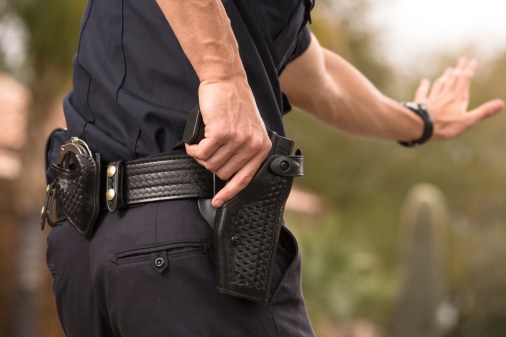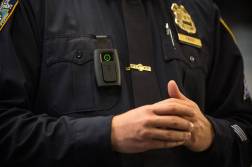Boston police union goes to court to block body camera pilot program

Boston’s police union is taking legal action to block the rollout of the city’s body camera pilot program, just days ahead of its proposed kickoff.
The Boston Police Patrolmen’s Association filed a request for an injunction to halt the program in Suffolk County Superior Court late last week, claiming that Mayor Martin Walsh and Police Commissioner William Evans violated the agreement they signed with the union last month.
That deal stipulated that the department would find 100 officers to volunteer for the program, but when Evans struggled to find anyone willing to wear the cameras for the six-month pilot, he decided to move ahead and pick participants for it instead. He tapped Anthony Braga — the director of the School of Criminology and Criminal Justice at Northeastern University — to identify a racially diverse group of officers to participate in the program, and with those results in hand, the city was set to start the pilot on Friday.
But the union believes those developments directly contradict their previous compact with the city, charging that any mandatory body camera program would be subject to collective bargaining.
“We worked hard with officials of the city and the department to bring the citizens of Boston a body camera pilot program that made sense and protected everyone’s rights,” Union President Patrick Rose said in a statement. “The city and the union agreed from day one that the best way to go was to make it a voluntary program. The BPPA can’t stand by and allow the City to blatantly violate the agreement it signed just over a month ago — we had to act and act quickly to prevent this miscarriage of justice.”
A spokeswoman for Walsh told StateScoop that the mayor’s office is “still reviewing the injunction.”
[Read more: Mass. bill requiring all police to wear body cameras faces uncertain future]
Meanwhile, the response from civil rights advocates in the city has been swift, and uniformly negative. In a statement, the leaders of the Boston Police Camera Action team argue that the union didn’t hold up its end of the bargain with the city to find volunteers for the program, giving Walsh and Evans no choice but to press forward with the program.
“For too long, police unions have colluded behind closed doors to twist the arms of taxpayers into deleterious agreements,” Segun Idowu and Shekia Scott, the group’s co-organizers, wrote. “We stand up to bullies. We will not allow the police unions to twist our arms or logic any longer in order to meet their dangerous demands. Neither shall we allow this union to continue to publicly humiliate its own members with its shameful acts of grandstanding, further eroding the trust and respect it seeks to regain.”
Indeed, the advocates charge that their own conversations with officers around the city suggest that most support the department adopting body cameras, a position directly in contrast with the union’s actions.
“BPCAT supports the right of all unions to exist and fight fiercely for the best interests of its members,” Idowu and Scott wrote. “However, this is the first time in our memory that we have seen union leadership go so far to misrepresent, or not represent at all, the wishes of a majority of its own members.”
They also blasted the union’s legal action as an “attempt to block a reform measure that seeks to bring transparency to a profession that has historically gone without it.”
The group has been calling for the department to adopt the technology since 2014, but after a series of fits and starts, the city finally seemed on course to move ahead with the pilot before the year’s end. Now, the future of the program is unclear — Walsh’s spokeswoman declined to comment any further on what the injunction could mean for the pilot.
That sort of delay could have major implications around the state. James Machado, executive director of the Massachusetts Police Association, previously told StateScoop that he believes “everything is on hold until the Boston pilot program is done” when it comes how other departments might examine using the technology.






